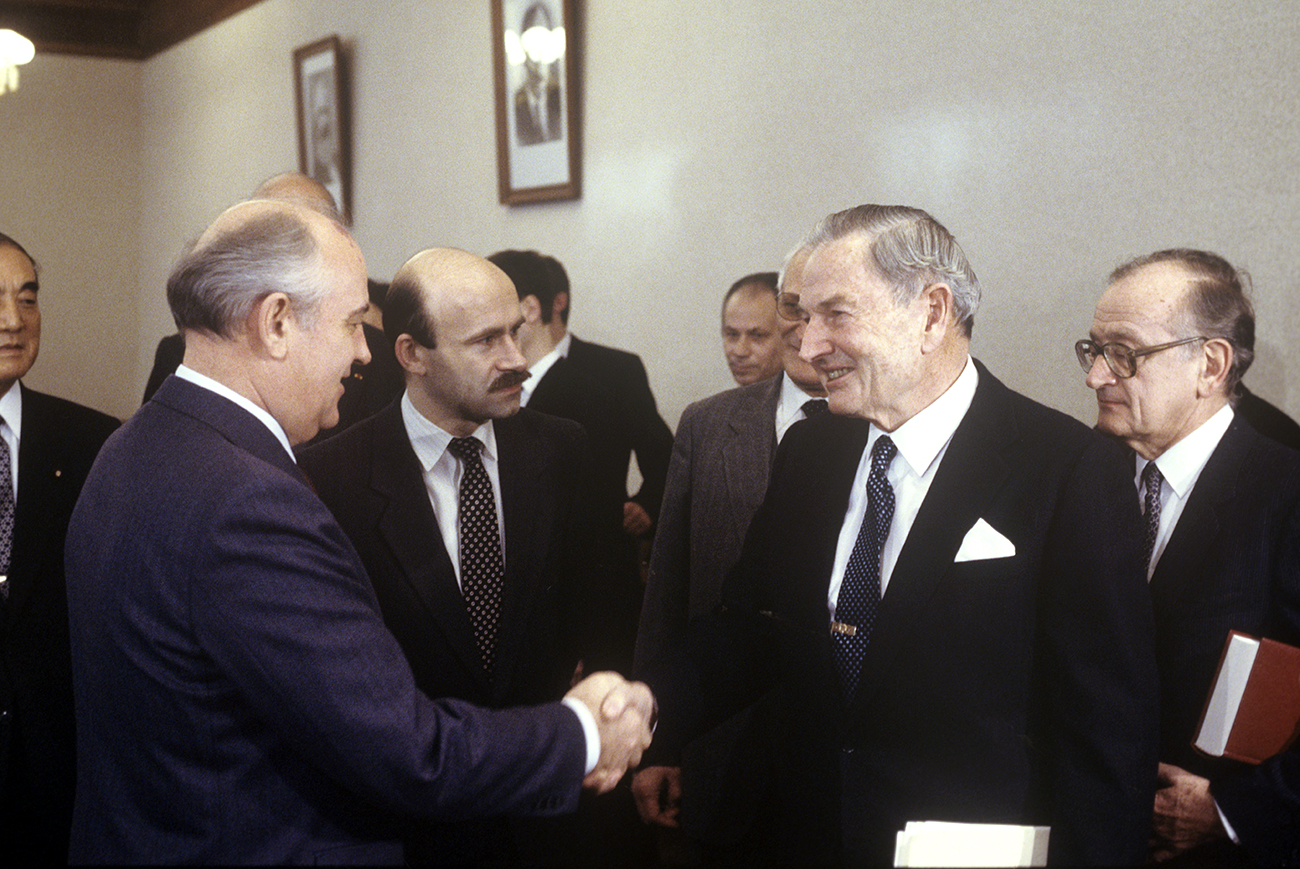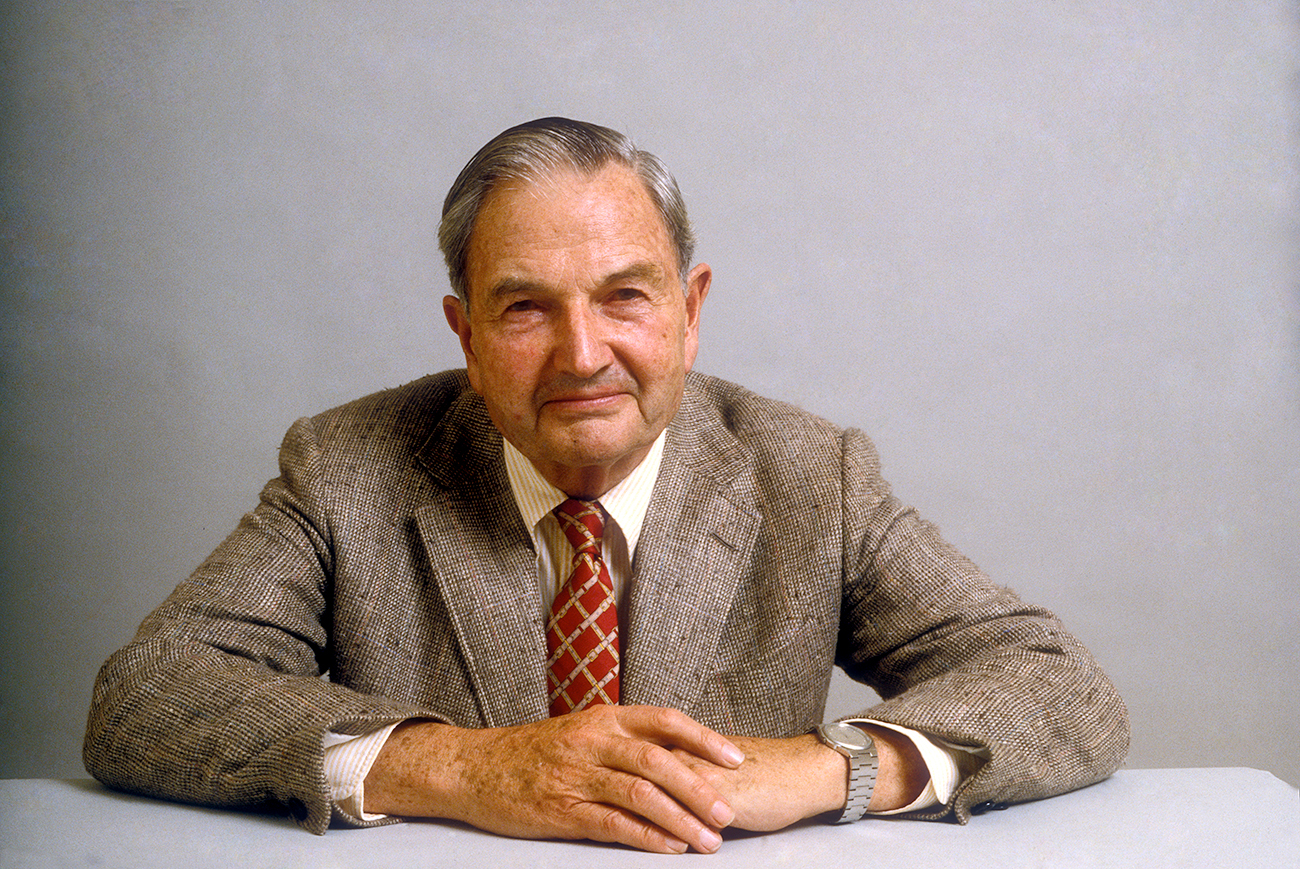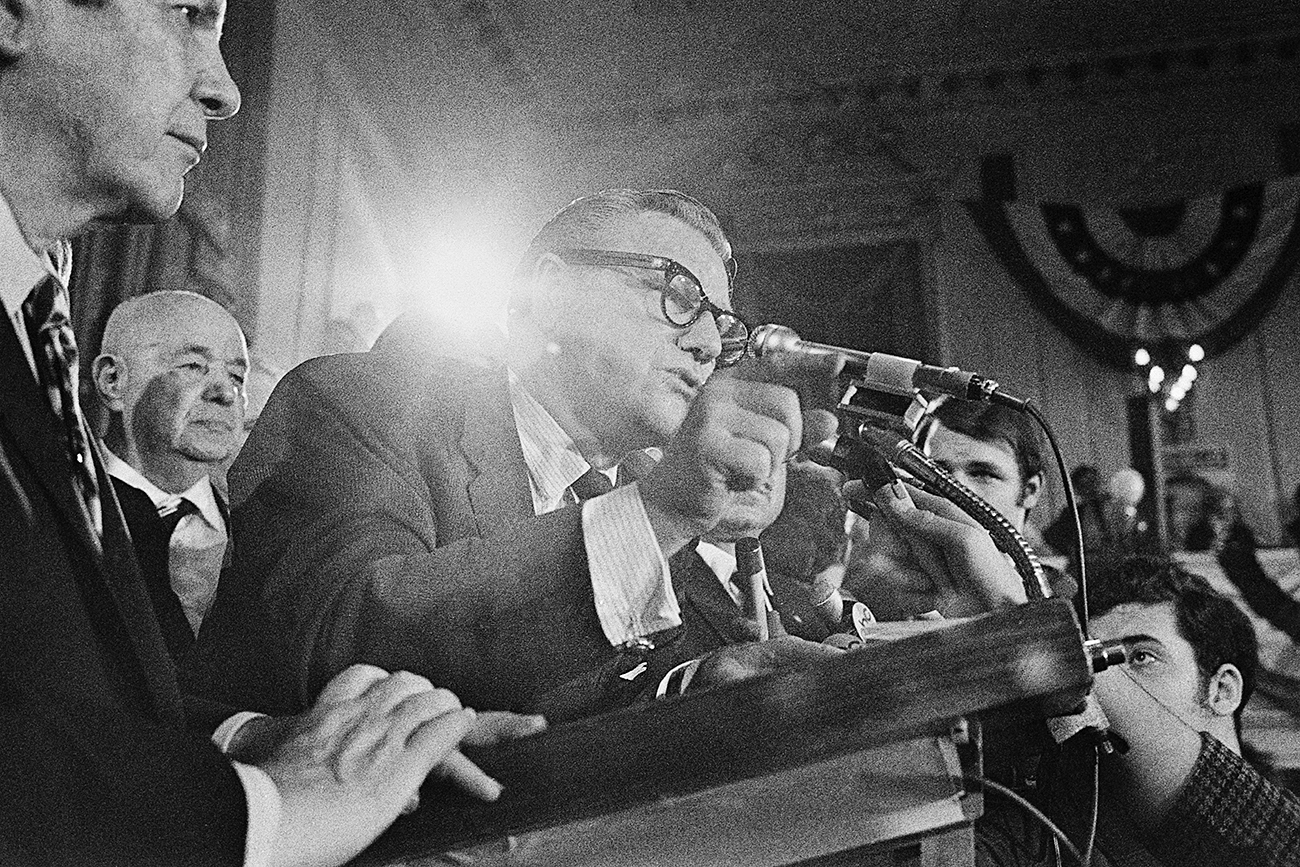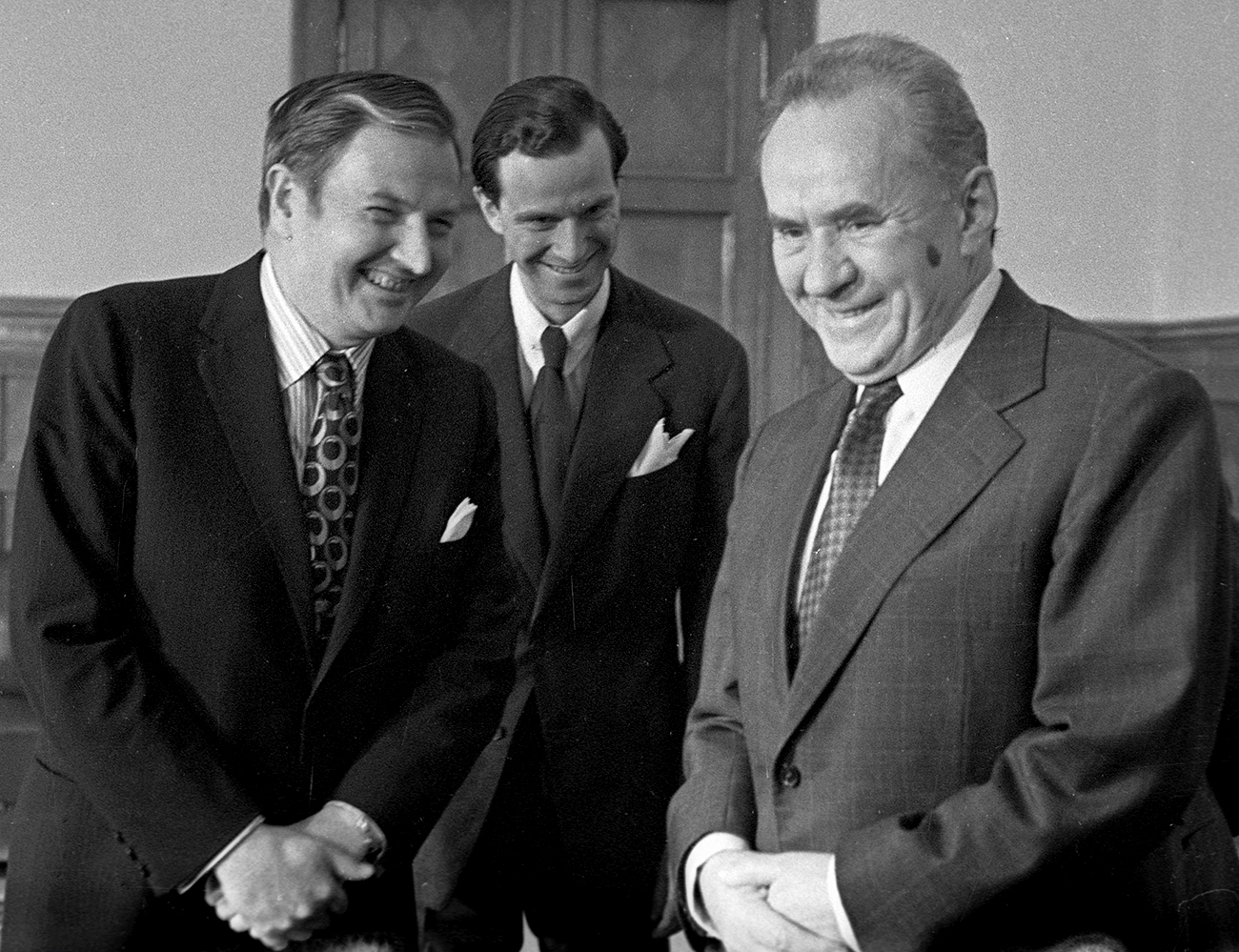David Rockefeller: Making friends in Russia

General Secretary of the CPSU Central Committee Mikhail Gorbachev, left, and committee co-chairman David Rockefeller (USA). Reception of the representatives of the Trilateral Commission during their USSR visit.
Vyacheslav Runov/RIA Novosti David Rockefeller. / Photo: Getty Images
David Rockefeller. / Photo: Getty Images
David Rockefeller is well known for his contacts with politicians around the world. He is believed to have personally met over 200 leaders of at least 100 countries. Add this to Rockefeller's participation in the secretive Bilderberg Group, his founding of the Trilateral Commission, and chairmanship of the Council on Foreign Relations for 15 years, and there’s fertile ground for speculation that the billionaire was involved in some kind of shadowy world government. But his relations with the Soviet Union show what Rockefeller, a member of one of the richest American families, really sought.
Rockefeller, one of the heirs to the wealth of the founder of the Standard Oil empire, was in contact with Soviet leaders during the 1960s and 70s. During this time he became the head of one of the biggest American banks - Chase Manhattan.
In his memoirs, Rockefeller says that in order for the bank to grow internationally it was necessary to learn to interact with regimes which were "opposed to democratic principles and to the operation of the free market" but which dominated much of the world. The billionaire regarded the USSR as one such regime. He succeeded in establishing relations with Soviet leaders and Chase became the first American bank to open a representative office in the Soviet Union.
Dartmouth Conferences
The Chase representative office opened in 1973 in the very center of the Soviet capital. Before this, Rockefeller had been meeting with representatives of the Soviet public and USSR state officials regularly over 10 years, and their meetings took place in the format of so-called Dartmouth Conferences that were first organized in the U.S. and USSR at the initiative of President Dwight D. Eisenhower. They were intended to encourage cooperation between the two superpowers during the Cold War.
 American banker and philanthropist David Rockefeller. / Photo: Getty Images
American banker and philanthropist David Rockefeller. / Photo: Getty Images
Tough conversation with Khrushchev
The idea of Rockefeller meeting Soviet leader Nikita Khrushchev came from UN Secretary General U Thant, according to the billionaire's memoirs. The meeting took place in 1964 when Rockefeller came to Leningrad to take part in one of the first Dartmouth Conferences. Khrushchev invited the billionaire and his daughter to visit the Moscow Kremlin. According to Rockefeller, the meeting with Khrushchev was unusual - "tough, at times combative, even hostile".
Rockefeller reproached Khrushchev for using local Communist parties to effect regime change in various countries of Latin America and Asia. The Soviet leader responded, not without irritation, that revolutions are born for objective reasons and not as a result of outside interference from anyone. Despite the harsh words spoken during their conversation, Rockefeller left the Kremlin "feeling a great respect for Khrushchev" and with the thought that the "Soviet leadership wanted to expand financial and commercial ties with the United States".
Congress a hindrance to normalization
Rockefeller was in favor of a normalization of relations between the U.S. and USSR, according to Academician Georgy Arbatov, the organizer of the Dartmouth Conferences on the Soviet side, writing in his book Hawks and Doves of the Cold War. The Soviet academic referred to his American opposite number as a modest, cultured man with swift reactions and a sharp mind.
In the words of Rockefeller himself, the billionaire belonged to a small group of American bankers who wanted to expand trade with Moscow and its Eastern European satellites, believing that favorable "political consequences" would follow from the development of trading contacts. The billionaire himself complained that this was in large measure hampered by the adoption of the Jackson-Vanik Amendment by Congress in 1974, which imposed a ban on granting the USSR most-favoured nation status in trade.
 Chairman of the USSR Council of Ministers Alexei Kosygin (right) meeting in the Kremlin U.S. banker David Rockefeller (left). / Photo: Yuriy Ivanov/RIA Novosti
Chairman of the USSR Council of Ministers Alexei Kosygin (right) meeting in the Kremlin U.S. banker David Rockefeller (left). / Photo: Yuriy Ivanov/RIA Novosti
During the 1970s, Rockefeller traveled to the USSR almost every year and met Prime Minister Alexei Kosygin several times. The banker noted his government's economic achievements. Rockefeller was struck most of all by the Moscow Metro at that time: "The Moscow subway system was a marvel - modern, clean, comfortable, and cheap." Kosygin wanted economic contacts between the two countries to be broadened, proposing steps that seem revolutionary even by today's standards. In his memoirs Rockefeller mentions the Soviet premier's idea that the American side could finance the construction of nuclear power stations in the USSR, which would be jointly owned by the U.S. and USSR.
Gorbachev and ruble convertibility
Rockefeller also met Mikhail Gorbachev and was acutely struck by his charm and easy manner. At the meeting, the banker asked the final leader of the Soviet Union how he planned to "open up" the Soviet economy and whether the ruble would become convertible. But the billionaire received no answer then from the new leader.
 General Secretary of the CPSU Central Committee Mikhail Gorbachev, left, and committee co-chairman David Rockefeller. Reception of the representatives of the Trilateral Commission during their USSR visit. / Photo: Vyacheslav Runov/RIA Novosti
General Secretary of the CPSU Central Committee Mikhail Gorbachev, left, and committee co-chairman David Rockefeller. Reception of the representatives of the Trilateral Commission during their USSR visit. / Photo: Vyacheslav Runov/RIA Novosti
The banker met Gorbachev a number of times, including in 1992 after the collapse of the USSR. A few years earlier Rockefeller had met Boris Yeltsin. The future Russian president visited the U.S. for the first time in 1989 and addressed the Council on Foreign Relations. This was followed by a dinner presided over by the American banker. Lev Sukhanov, who was adviser to the first president of Russia, recalls that Rockefeller made his personal jet available to Yeltsin to fly across the U.S.
Rockefeller visited post-Soviet Russia in 2003. The aim of the visit was reported to be the launch of a Russian-language edition of his memoirs.
Read more: Depicting Americans through the lens of Russian cinema
If using any of Russia Beyond's content, partly or in full, always provide an active hyperlink to the original material.
Subscribe
to our newsletter!
Get the week's best stories straight to your inbox